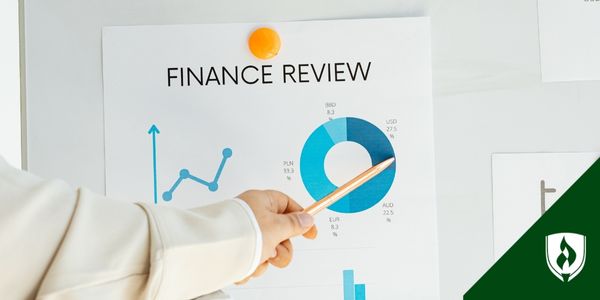What Can You Do With a Business Degree?
11/25/2025

Exploring the Value of a Business Education
If a business degree is on your radar, you might be curious about the kinds of roles it can lead to. A business degree may provide a foundation in understanding how organizations operate, from managing financial records and analyzing data to understanding business strategy and day-to-day operations.
Through a business administration degree,1 you’ll also explore areas like market research, project management, and organizational leadership; skills that can be applied across many different business careers. Whether you’re interested in finance, marketing, human resources, or supply chain management, studying business may help you develop the tools to make informed decisions and navigate the business world with confidence.
Choosing a Business Major
When selecting a business major, consider your career goals, personal interests, and the type of business processes that appeal to you. A business administration program2 can provide a broad perspective on managing people, projects, and organizations, while specialized programs — such as finance, marketing, supply chain, or human resources — offer more targeted preparation for particular career paths.
At Rasmussen University, you can choose from several undergraduate business degrees,1 including associate and bachelor’s degree in business options. These programs cover subjects like financial reports, business analytics, operations management, and business strategy, helping you understand how organizations manage and analyze financial data and market trends.
You may also explore graduate school opportunities if you want to continue your education. You can pursue a master’s degree such as the Master of Business Administration (MBA) or Master of Human Resources Management (MHRM). Both graduate-level programs emphasize leadership, organizational strategy, and advanced business analytics skills.
Rasmussen’s business programs are available1 online and are designed with flexibility in mind, which may be ideal if you are balancing academics with work or family commitments.
Typical Career Paths and Business Opportunities
A degree in business may help to prepare you to explore a wide range of roles across industries, from finance to marketing to operations management.
Typical career paths for business graduates may include:
- Banking and Finance: You may3 analyze financial records, assess financial statements, and support financial planning to help maintain organizational financial health.
- Customer Service: You may4 focus on improving customer satisfaction, developing service systems, and building long-term client relationships.
- Healthcare Administration: You may5 manage resources, coordinate staff, and oversee business operations in hospitals, clinics, and other medical facilities.
- Human Resources: You may6 support recruiting, training, and performance initiatives to help organizations maintain efficient teams and positive work environments.
- Logistics and Manufacturing: You may7 work in supply chain management, ensuring that production and distribution run smoothly and that business processes are optimized.
- Marketing and Sales: You may8 use market research and consumer behavior insights to design marketing plans, develop marketing strategies, and launch marketing campaigns.
- Operations and Project Management: You may9 oversee business operations, coordinate teams, and develop strategies to help projects meet goals on time and within scope.
- Supply Chain Management: You may7 coordinate logistics, inventory, and distribution systems to help keep the supply chain efficient and cost-effective.
You may also choose to apply your education toward launching your own business, combining creativity, leadership, and strategic planning to bring new ideas to market.
Employment opportunities and career paths vary based on individual experience, education, and local job market conditions. Rasmussen University does not guarantee any specific career outcomes.
Business Careers and Industry Outlook
As organizations adapt to an increasingly data-driven, global economy, business professionals who understand financial management, project management, and business analytics may continue to play a critical role in decision-making and strategy.
Trends such as10 digital transformation, artificial intelligence, cybersecurity, automation, and sustainability are shaping the business landscape, creating ongoing opportunities for those with a foundation in business operations and data analysis. Business professionals may use skills in managing financial records, interpreting market trends, and improving business processes to adapt to these changes.
From marketing communications and customer service to logistics and healthcare administration, business careers span a wide range of fields where analytical thinking, financial planning, and organizational strategy all contribute to a company’s overall financial health.
Education and Training at Rasmussen University
At Rasmussen University, you may earn1 undergraduate business degrees and graduate business degrees designed to help prepare you to become a confident, results-oriented professional. Rasmussen’s School of Business offers online programs1 that combine foundational knowledge with practical skills in business strategy, data analysis, and organizational management.
You can choose from the following business degree programs:1
- Accounting (Certificate, Associate’s, or Bachelor’s)
- Business (Certificate)
- Business Management (Associate’s or Bachelor’s)
- Finance (Bachelor’s)
- Healthcare Management (Bachelor’s)
- Human Resources and Organizational Leadership (Associate’s or Bachelor’s)
- Marketing (Associate’s or Bachelor’s)
- Master of Business Administration (MBA)
- Master of Human Resources Management (MHRM)
- Supply Chain and Logistics Management (Bachelor’s)
Rasmussen University’s Empowered Learning® model allows1 students to learn by doing, manage their own pace, and stay connected with faculty and peers through a flexible online format. Students may also earn Knowledge Credit® to save time and money through transfer credits, credit for prior learning, or self-directed assessments.
Since its founding in 1900, Rasmussen University remains committed to helping students develop critical thinking, leadership, and business analytics skills needed to adapt in today’s fast-changing global marketplace. The School of Business is a Candidate for Accreditation with the Accreditation Council for Business Schools and Programs® (ACBSP®), reflecting its commitment to academic quality and excellence.
You may also benefit from mentorship and access to supportive faculty who bring real-world business experience into the virtual classroom.
Transferable Skills at Rasmussen University
Transferable skills, or soft skills, are a set of essential abilities that transcend program or credential and may position you for success as you develop and build your career. These skills support1 your career goals by helping you in key areas such as decision-making, teamwork, communication, and information literacy.
Every degree program at Rasmussen University is designed1 around these transferable skills, helping ensure that you not only gain technical knowledge but also build the interpersonal and analytical abilities employers often value. This focus on soft skills is one more way Rasmussen aims to help you open the door to more career opportunities—whether you’re pursuing your first bachelor’s degree in business, advancing to a master’s degree, or seeking to enhance your professional growth in the business world.
Building a Foundation in Business for the Future
Earning a business degree from Rasmussen University may help you develop practical business skills, deepen your understanding of financial management, and strengthen your ability to analyze market trends. Whether you see yourself working in operations management, marketing, human resources, or financial analysis, Rasmussen’s business programs are designed to provide a flexible, career-focused education that supports your academic and professional goals.
If you’re ready to explore where a bachelor’s degree in business or an MBA could take you, Rasmussen University’s admissions team can help you find the right degree program for your interests and long-term aspirations.
Employment conditions and career outcomes vary based on individual qualifications, experience, and market factors. Rasmussen University does not guarantee employment, promotion, salary increase, or career advancement. External sources are provided for informational purposes only and do not constitute an endorsement. Accreditation does not guarantee employment or career advancement.
The Accreditation Council for Business Schools and Programs® is a registered trademark of the Accreditation Council for Business Schools and Programs, 11520 W. 119th Street Overland Park, KANSAS UNITED STATES 66213.
1Rasmussen University, Business Degree Programs, https://www.rasmussen.edu/degrees/business/ (accessed October 23, 2025).
2Rasmussen University, Business Management Degree, https://www.rasmussen.edu/degrees/business/business-management/ (accessed October 23, 2025).
3Bureau of Labor Statistics, U.S. Department of Labor, Business and Financial Occupations, https://www.bls.gov/ooh/business-and-financial/ (accessed October 23, 2025).
4Bureau of Labor Statistics, U.S. Department of Labor, Occupational Outlook Handbook, Customer Service Representatives, at https://www.bls.gov/ooh/office-and-administrative-support/customer-service-representatives.htm#tab-2 (accessed October 23, 2025). Employment conditions may vary.
5Bureau of Labor Statistics, U.S. Department of Labor, Occupational Outlook Handbook, Medical and Health Services Managers, at https://www.bls.gov/ooh/management/medical-and-health-services-managers.htm#tab-2 (accessed October 23, 2025). Employment conditions may vary.
6Bureau of Labor Statistics, U.S. Department of Labor, Occupational Outlook Handbook, Human Resources Specialists, at https://www.bls.gov/ooh/business-and-financial/human-resources-specialists.htm#tab-2 (accessed October 23, 2025). Employment conditions may vary.
7Bureau of Labor Statistics, U.S. Department of Labor, Occupational Outlook Handbook, Logisticians, at https://www.bls.gov/ooh/business-and-financial/logisticians.htm#tab-2 (accessed October 23, 2025). Employment conditions may vary.
8Bureau of Labor Statistics, U.S. Department of Labor, Occupational Outlook Handbook, Advertising, Promotions, and Marketing Managers, at https://www.bls.gov/ooh/management/advertising-promotions-and-marketing-managers.htm#tab-2 (accessed October 23, 2025). Employment conditions may vary.
9Bureau of Labor Statistics, U.S. Department of Labor, Occupational Outlook Handbook, Project Management Specialists, at https://www.bls.gov/ooh/business-and-financial/project-management-specialists.htm#tab-2 (accessed October 23, 2025). Employment conditions may vary.
10U.S. Small Business Administration, "These Small Business Trends Look to Shape 2024, https://www.sba.gov/blog/2023/2023-11/these-small-business-trends-look-shape-2024 (accessed October 23, 2025).



